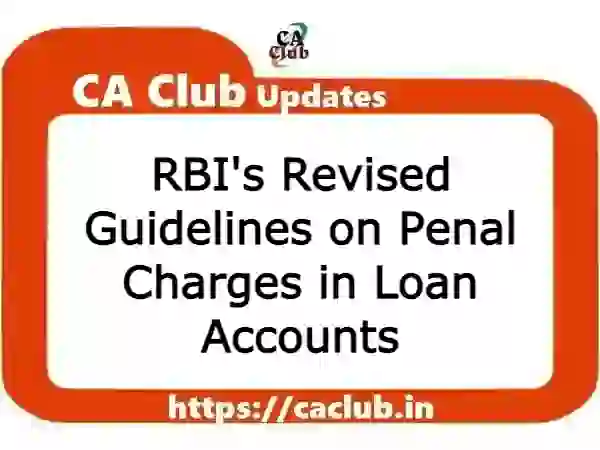RBI has issued revised guidelines on “Fair Lending Practice – Penal Charges in Loan Accounts” on August 18, 2023. These guidelines are addressed to a wide range of banks and financial institutions (Regulated Entities (REs)), including Commercial Banks (including Small Finance Banks, Local Area Banks, and Regional Rural Banks), Primary (Urban) Co-operative Banks, Non-Banking Financial Companies (NBFCs), including Housing Finance Companies (HFCs), and All India Financial Institutions such as EXIM Bank, NABARD, NHB, SIDBI, and NaBFID.
Ensuring Reasonableness and Transparency
The RBI has consistently provided guidance to Regulated Entities (REs) to maintain transparency and reasonableness in disclosing penal interest. The existing guidelines grant lending institutions the autonomy to establish a board-approved policy for imposing penal rates of interest. However, it has been observed that many REs impose penal rates of interest in addition to the regular interest rates in cases of borrower defaults or non-compliance with the credit terms.
Objective of Penal Interest/Charges
The primary purpose of imposing penal interest/charges is to foster credit discipline, rather than using them as a tool for increasing revenue beyond the agreed interest rates. However, supervisory reviews have uncovered inconsistent practices among REs concerning the imposition of penal interest/charges, leading to customer grievances and disputes.
Revised Guidelines on Penal Charges
On thorough examination of the practices regarding penal interest/charges, the RBI has issued following instructions:
(i) Nature of Charges: Penalties for non-compliance with essential terms of the loan contract will be regarded as ‘penal charges’ rather than ‘penal interest’ added to the interest rate on the loan. These charges will not be compounded further with interest. However, this change will not affect the usual process of interest compounding in the loan account.
(ii) Interest Rate Components: REs are prohibited from introducing additional components to the interest rate and are required to adhere to these guidelines both in words and intent.
(iii) Board Approved Policy: REs must formulate a board-approved policy for imposing penal charges or similar charges on loans, regardless of the nomenclature.
(iv) Reasonable Quantum: The quantum of penal charges must be reasonable and proportionate to the extent of non-compliance with the key terms of the loan contract. This quantum should not discriminate within a specific loan or product category.
(v) Uniformity for Individuals: In the case of loans granted to ‘individual borrowers for non-business purposes,’ the penal charges should not surpass those applicable to non-individual borrowers facing similar non-compliance.
(vi) Transparency in Disclosure: REs must transparently disclose the quantum and rationale for penal charges in the loan agreement, as well as in the most important terms & conditions or Key Fact Statement (KFS), if applicable. These details should also be prominently displayed on the REs’ website under the “Interest Rates and Service Charges” section.
(vii) Communication of Charges: Whenever reminders for non-compliance are sent to borrowers, the relevant penal charges must be communicated. Additionally, instances of imposing penal charges and the reasons behind them should be communicated to borrowers.
(viii) Effective Date and Implementation: These instructions will come into effect from January 1, 2024. REs should revise their policy framework accordingly and ensure compliance with the new instructions for all fresh loans availed or renewed from the effective date. For existing loans, the transition to the new penal charges regime should occur at the next review or renewal date, or within six months from the effective date of this circular, whichever comes earlier.
Regulatory Authority and Updates
These directives are issued under relevant sections of the Banking Regulation Act, 1949, Reserve Bank of India Act, 1934, and National Housing Bank Act, 1987. These will be updated in the applicable Master Directions/Master Circulars of the respective REs. For a detailed list of amendments, please refer to the Annexure to the attached Notification.
RBI Notification dated 18/08/2023: Revised Guidelines on Penal Charges in Loan Accounts
Scope Exceptions
It’s important to note that these instructions do not apply to specific financial products like Credit Cards, External Commercial Borrowings, Trade Credits, and Structured Obligations, which are governed by distinct product-specific guidelines.
In conclusion, these revised RBI guidelines mark a significant step toward transparency and fairness in the realm of loan penal charges. By prioritizing credit discipline and reasonable charges, the financial landscape in India is poised for positive change. As these instructions take effect from January 1, 2024, they herald a new era of accountability and clarity in lending practices.
